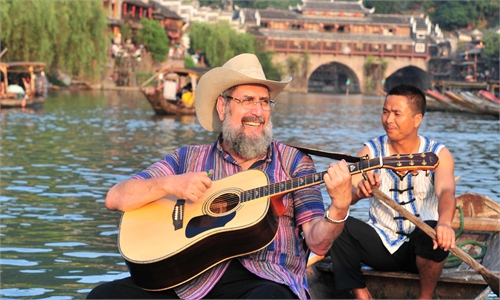ARTS / BOOKS
American dream fulfilled in China
US writer shares his Chinese rural life stories in new book

Brian Linden (left) talks with local residents in Xizhou township in Southwest China's Yunnan Province in July 2020. Photo: VCG
Arriving in China 38 years ago with only the barest knowledge of the country, Brian Linden, a Stanford PhD candidate who was once trapped in a carpet cleaning job, never imagined that one day he would say "China has made my American dream come true."
Now the American, who lives in Xizhou township in Southwest China's Yunnan Province, has published a book in Chinese about the cultural stories he has seen in rural China: One Village at a Time.
'Nuanced' Chinese stories
Compiling his journals spanning from the mid-1980s to 2020, One Village at a Time is a memoir documenting his time living in the rural region of Yunnan.
Linden told the Global Times that compared with writing about Chinese metropolises where topics like "Starbucks" and "Transformers" are a part of people's daily conversations, he found China's rural life is full of "nuanced and rich" stories that reflect the real changes the country has undergone.
He noted that the country's efforts in poverty alleviation have amazed him. During the interview, he said one of his most memorable experiences was watching a large cement truck pave a road to the province's Shi Long village, a small village that only has 600 residents.
Although he came to China for university life in 1984, he received an unexpected acting offer that same year. Linden said that the experience of shooting a film, which he starred in alongside Dutch and Tanzanian actors, gave him his first taste of China's openness to international cultures.
Linden left for a while to pursue higher education at the US's prestigious Stanford University in the late 1980s. Yet during his absence, he never forgot his mission to introduce traditional Chinese culture to people in the US.
In his book, he noted that he was fascinated by China's Jingdezhen porcelain culture, which led him to open up a small gallery near Chicago in 1996 to show off his porcelain collection as well as other works of art such as wood carved Buddha statues and traditional paintings.
"In places like the States, there are so many people who are actually very impressed by Asian craftsmanship," Linden told the Global Times.
Liden's journey to bridge China and the US through culture was never a one-way street. The Linden Center in Xizhou township is an inn run by Linden that hosts tourists as well as cultural programs.
The inn was built in a renovated building that shows the quintessence of the Bai ethnic group's architecture style. Since it first opened in 2007, Linden has welcomed numerous foreign visitors. Along with providing them a place to stay, he acts as tour guide, taking them around to introduce local village culture.
"The US-China conversation isn't just about politics and economics, but also soft culture," Linden noted.
Why China?
Though Linden, a middle-aged versatile with multiple titles, has been viewed by many as a success, he still remembers his time as a young working-class man who felt flummoxed by life.
Growing up in a family that faced stern financial challenges, Linden did his best to share the burdens of his father, a man who had difficulties reading but introduced to Linden the works of French philosopher Albert Camus. The young man put himself through community college by working as a carpet cleaner.
Life was puzzling for the young man until 1983, when Linden accidentally came across a scholarship program for China. He sent in his application to the Chinese Embassy in the US with an enclosed letter titled "My struggles pursuing the American Dream."
"We all grew up with this idea that the American Dream is real; I told them [the Embassy] that in some ways I will never be able to live according to the American Dream," Lin said.
Recalling when he received the embassy's acceptance letter, Liden said that he was a bit bewildered about why China would accept a man who came from nothing. But the Chinese lady who handled his application told him, "We chose you because you are a worker and can benefit the most from this opportunity."
This lifebuoy gave Linden, who was drowning in the social-class privilege dominated Western society, a new chance to chase his American dreams of "being successful" even though it was not in the US.
Having traveled and learned a lot about China, he told the Global Times that he can see just how much the Chinese government has safeguarded younger generations, especially those living in rural regions.
"I see they [rural youth] want to be successful. Success is much easier because everything is more accessible to everyone now," Linden remarked.
Establishing his own educational center beside the Linden Center, the dream chaser has set up a program that brings Ivy League candidate students in the US to the town so they can see what China is really like.
"The world will not be a very nice place if we are not able to be friends and work together."

